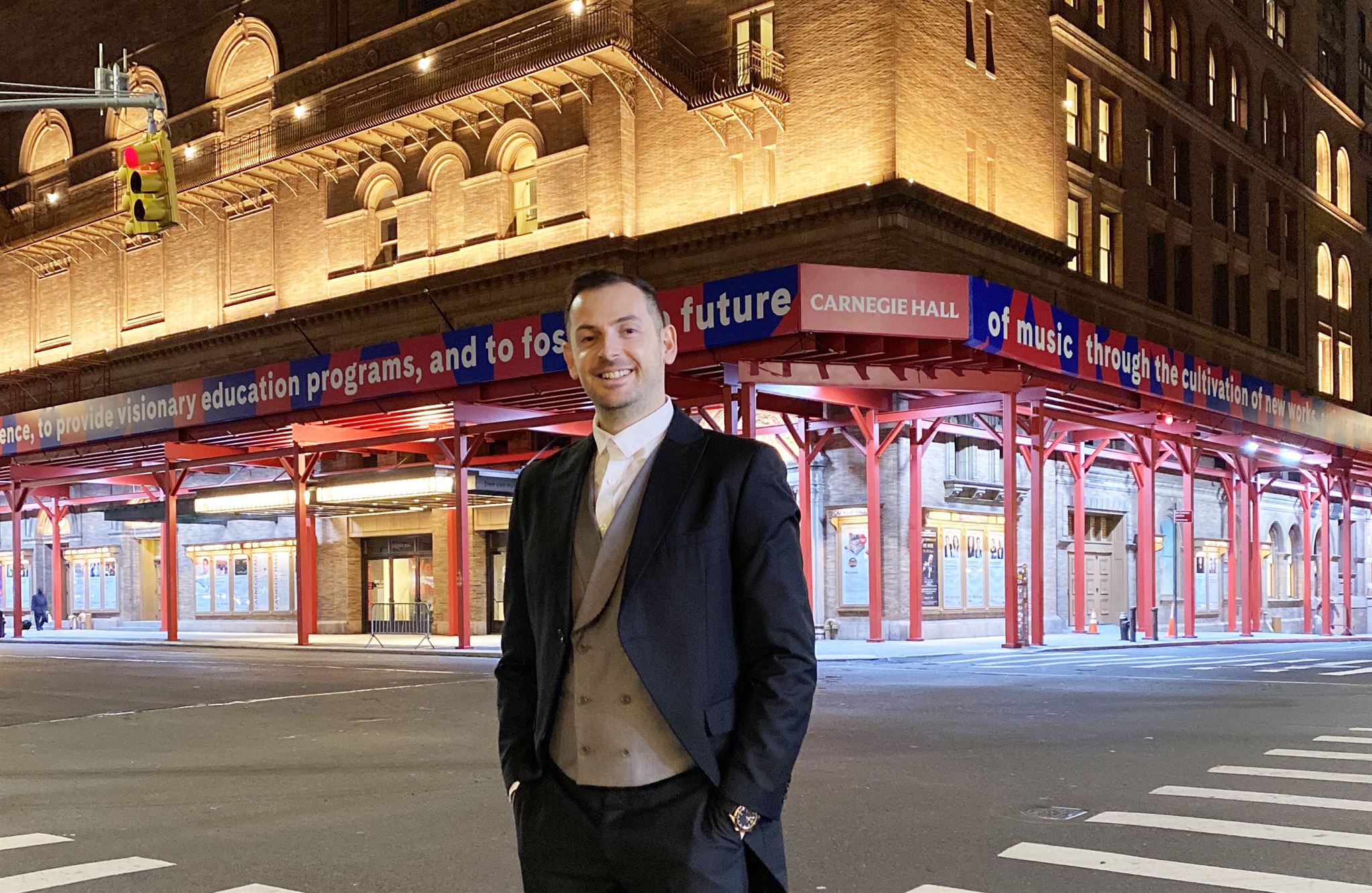#FocusDisruption is a collaboration of all the media outlets within Montclair State’s School of Communication and Media. Our goal is to report stories that highlight the effects or disruption of the last two years and the solutions that have come out of it. All aspects of day-to-day life have been altered but we will be primarily focusing on how mental health, education and the workplace have changed.
Margin Alexander’s musical talent brought him to places in the United States and Europe. The coronavirus (COVID-19) pandemic brought him to people’s screens. And the present brings him a mix of both.
A New York City-based composer and pianist, Alexander began studying music in Europe at the age of 14. Pursuing higher education, he graduated from Montclair State University in 2011 with a bachelor’s in music theory and composition before receiving a master’s in arts and teaching in 2015.
Throughout his college career, he participated in collaboration opportunities under the guidance of Grammy award-winning composer Robert Aldridge. This included working with the dance department, orchestra reading, Harry Partch Ensemble and concert choir. Alexander refers to this as a turning point in his life, building passion within him to reach where he is now in his musical journey.
“[Montclair State] offered an array of ensembles and various performance opportunities for composers and performers,” Alexander said. “Throughout each semester and year, I had the opportunity to perform multiple times on stage and in various settings. This was a golden ticket toward gaining experience as a composer and performer.”

Alexander graduated from Montclair State in 2011 with a bachelor’s in music theory and composition before receiving a master’s in arts and teaching in 2015.
Photo courtesy of Margin Alexander
The time that followed is filled with steady performances of original neoclassical/neo-romantic compositions in locations like New Jersey, New York, Illinois and California. That is, up until the first wave of COVID-19 brought about a slew of canceled and postponed events, an obstacle to all arts, according to Alexander.
“Without an audience, a performance is not the same at all,” Alexander said. “Therefore, there was a great amount of discouragement, suffering, disappointment, etc. I had many concerts scheduled and was at the peak of my emerging career. Then, [COVID-19] happened. My tours in Indonesia and Russia were canceled. A concert tour in the United States was also canceled. I had to reconfigure myself.”
Alexander did just that and created a new strategy for himself. He acquired a movable digital baby grand piano to use on the go and ran many of his concerts virtually. The musician also continued to connect with other artists, leading to new collaborations and pieces as a result.
One of these collaborators includes Celeste Chau, who knows Alexander through the Association of Classical Musicians and Artists, of which both are members. While Chau and the organizations she is part of went through a difficult time brought about by COVID-19, she featured his music in a Play-In for the Association of Chamber Music Players in 2018, confirming her prior discovery of his “melodic cinematic style” as a composer and a musician that is “professional, without ego and extremely personable.”
“[Alexander] really came through for us,” Chau said. “He recorded a beautiful concert with short talks about his inspirations, and he recorded and edited it himself. All we had to do was to broadcast it. This was a huge relief for us as [we] were still struggling and figuring out what to do. We were still all on lockdown, so he really helped save our concert series to keep our community entertained and inspired by his music from the safety of their homes.”

Alexander performed at a private concert at a New York City Victorian-style mansion.
Photo courtesy of Margin Alexander
Another artist inspired by Alexander is film director Nikolas Grasso. Since meeting one another, Grasso has asked Alexander to act as an Italian American main character in his short film “Tavola” — a fitting role considering the musician’s ability to fluently speak five languages, one of which is Italian.
Grasso met Alexander in 2018 at the IBLA Grand Prize in Sicily, a music competition where Grasso’s wife was also participating. Feeling an instant connection, Grasso visited him several times in the United States and met with him on international tours in Europe where his wife performed alongside Alexander.
Grasso noted Alexander’s commitment to art and strong work ethic.
“He was very perseverant during [COVID-19] and didn’t have second thoughts about traveling all over Europe to keep giving concerts to his public,” Grasso said. “I met many people who are inspired by his music, and I can say he inspires me as well.”
Moving forward from the pandemic at its worst wave, Alexander’s first in-person performance was in Switzerland. He went on to perform concerts in the Netherlands, Germany, North Macedonia to name a few. In October 2021, he performed for the second time at Carnegie Hall for the debut of his “Blue Nocturne.”
As for what motivates Alexander through the pandemic and continues to push him forward as he works on new pieces and finalizes more international performances, it’s his love for music.
“Overall, music is power,” Alexander said. “Many people find comfort and consolation in music no matter where, no matter what. There are times when we feel so moved by a piece of music that no amount of traveling, financial wealth or any other form of happiness can compete with it. I strongly believe that music has been a lifesaver and will continue to be such in hard times like [COVID-19].”





